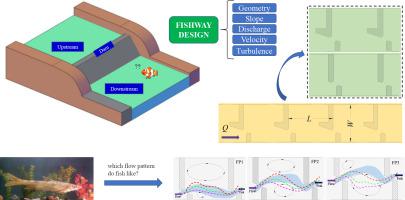Ecological Engineering ( IF 3.9 ) Pub Date : 2022-09-30 , DOI: 10.1016/j.ecoleng.2022.106796 Tiegang Zheng , Zhipan Niu , Shuangke Sun , Wei Huang , Chengyi Tu , Haitao Liu , Guangning Li , Hang Wang

|
Vertical slot fishways are increasingly common structures for the passage of a wide variety of migratory fish species, which account for 59.2% of all fish passage facilities in China. The slot structures and redirected flow in the pools are of great importance to guide the fish to swim through the fishway. To optimize the design of vertical slot fishways, physical experiments and numerical simulations were used to study the hydraulic characteristics for 10 different geometric configurations (referred to as designs D1-D10), combining with the study of fish behavior in the model. A comparative study on vertical slot fishway with L-shaped baffle (D1) and with a new vertical baffle (D2) was conducted. Flow patterns, velocity fields and other key hydraulic parameters including the maximum velocities and turbulence kinetic energy in the pools were analyzed. No obvious differences in all key hydraulic between designs D1 and D2 present in the study, which suggests an upgrade of the L-shaped baffle to the new vertical baffle with the advantage of being more compact and economical. When modifying design D2 in the baffle thickness and length (D3-D10), three typical flow patterns with the different area ratios of left recirculation region to right recirculation region (Scl/Scr) were observed in the pools, which were denoted as flow pattern 1 (FP1), flow pattern 2 (FP2) and flow pattern 3 (FP3). An analysis of the behavior of grass carp (Ctenopharyngodon Idella) in the scaled model clearly showed that the flow and structure in FP2, with the principal flow in the center position and suitable velocity gradient and recirculation area ratio, were more friendly to fish with better migrating efficiency, which present sufficient velocity gradient and area of cushion zone for migratory fish to pass with less energy consumption.

































 京公网安备 11010802027423号
京公网安备 11010802027423号